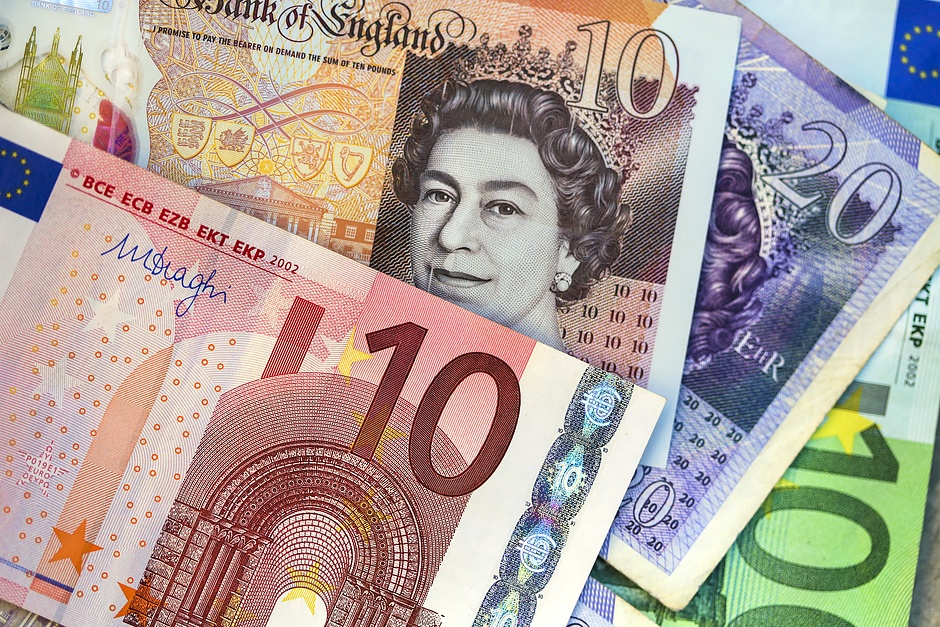Created
: 2024.11.22














![]() 2024.11.22 16:18
2024.11.22 16:18
The EUR/GBP cross gains momentum to near 0.8330 during the early European session on Friday. The Pound Sterling (GBP) weakens after the release of UK Retail Sales data for October. Later on Friday, traders await the preliminary Eurozone HCOB Purchasing Managers Index (PMI) and the European Central Bank's (ECB) President Lagarde speech for fresh impetus.
Data released by the Office for National Statistics (ONS) on Friday showed that UK Retail Sales declined 0.7% MoM in October versus a 0.1% increase (revised from 0.3%) in September. This figure came in below the market consensus of -0.3%. Meanwhile, Retail Sales, stripping the auto motor fuel sales, fell by 0.9% MoM in October, compared to a 0.1% rise (revised from 0.3%) in the previous reading, missing the estimation of a 0.4% decline.
The GBP attracts some sellers in an immediate reaction to the downbeat UK Retail Sales and acts as a tailwind for the EUR/GBP cross. The attention will shift to the preliminary UK S&P Global/CIPS PMI data, which is due later on Friday.
On the other hand, the rising speculation for more aggressive interest rate cuts by the European Central Bank (ECB) weighs on the shared currency. The ECB policymaker Yannis Stournaras said earlier this week that the central bank will reduce interest rates by 0.25% in December, with further cuts possible in 2025. Additionally, Bank of Italy governor Fabio Panetta said the ECB must commit to faster interest rate cuts in a bid to lift the Eurozone economy. However, Panetta also called on the ECB to ditch its current "meeting-by-meeting" guidance that avoids a longer-term commitment to its monetary policy.
The European Central Bank (ECB) in Frankfurt, Germany, is the reserve bank for the Eurozone. The ECB sets interest rates and manages monetary policy for the region. The ECB primary mandate is to maintain price stability, which means keeping inflation at around 2%. Its primary tool for achieving this is by raising or lowering interest rates. Relatively high interest rates will usually result in a stronger Euro and vice versa. The ECB Governing Council makes monetary policy decisions at meetings held eight times a year. Decisions are made by heads of the Eurozone national banks and six permanent members, including the President of the ECB, Christine Lagarde.
In extreme situations, the European Central Bank can enact a policy tool called Quantitative Easing. QE is the process by which the ECB prints Euros and uses them to buy assets - usually government or corporate bonds - from banks and other financial institutions. QE usually results in a weaker Euro. QE is a last resort when simply lowering interest rates is unlikely to achieve the objective of price stability. The ECB used it during the Great Financial Crisis in 2009-11, in 2015 when inflation remained stubbornly low, as well as during the covid pandemic.
Quantitative tightening (QT) is the reverse of QE. It is undertaken after QE when an economic recovery is underway and inflation starts rising. Whilst in QE the European Central Bank (ECB) purchases government and corporate bonds from financial institutions to provide them with liquidity, in QT the ECB stops buying more bonds, and stops reinvesting the principal maturing on the bonds it already holds. It is usually positive (or bullish) for the Euro.
![]()
Created
: 2024.11.22
![]()
Last updated
: 2024.11.22

FXStreet is a forex information website, delivering market analysis and news articles 24/7.
It features a number of articles contributed by well-known analysts, in addition to the ones by its editorial team.
Founded in 2000 by Francesc Riverola, a Spanish economist, it has grown to become a world-renowned information website.
We hope you find this article useful. Any comments or suggestions will be greatly appreciated.
We are also looking for writers with extensive experience in forex and crypto to join us.
please contact us at [email protected].
Disclaimer:
All information and content provided on this website is provided for informational purposes only and is not intended to solicit any investment. Although all efforts are made in order to ensure that the information is correct, no guarantee is provided for the accuracy of any content on this website. Any decision made shall be the responsibility of the investor and Myforex does not take any responsibility whatsoever regarding the use of any information provided herein.
The content provided on this website belongs to Myforex and, where stated, the relevant licensors. All rights are reserved by Myforex and the relevant licensors, and no content of this website, whether in full or in part, shall be copied or displayed elsewhere without the explicit written permission of the relevant copyright holder. If you wish to use any part of the content provided on this website, please ensure that you contact Myforex.
Myforex uses cookies to improve the convenience and functionality of this website. This website may include cookies not only by us but also by third parties (advertisers, log analysts, etc.) for the purpose of tracking the activities of users. Cookie policy